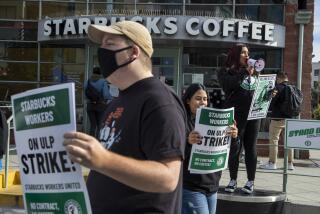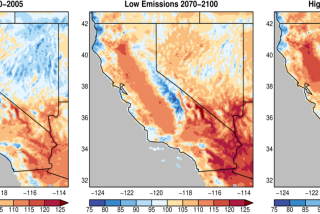Consumer class-action suits are on trial in California
SAN FRANCISCO — Consumer class-action lawsuits in California, which have encountered mounting skepticism from courts, face a major test in a tobacco case to be decided Monday by the state Supreme Court.
The court will determine whether smokers who say they purchased cigarettes in response to deceptive ads can collectively sue the industry for the money they spent to smoke.
The court has grappled with the case for more than two years, trying to determine the reach of Proposition 64, a 2004 initiative intended to stop bogus lawsuits aimed at extorting money from small business. During the last several years, lower courts have tossed out many consumer class actions and scrutinized settlements more closely.
“Judges have started . . . wondering why there was a million dollars in attorneys fees and virtually nothing for the people who were supposedly defrauded,” said Trent Norris, a San Francisco lawyer who defends corporations. “California is part of a national trend.”
Nowhere was this skepticism more evident than in an order earlier this year by Los Angeles County Superior Court Judge Brett Klein.
Klein, asked to approve a class-action settlement, ordered the attorney who filed the suit to be paid the same way as consumers in the class, with $10 gift cards -- 12,500 of them -- to stores that sell prom dresses and other ware for teenage girls.
Klein’s order came in a lawsuit charging that Windsor Fashion Store illegally required credit card users to provide their telephone numbers or e-mail or home addresses. Another judge overturned the order in February and awarded Yorba Linda lawyer Neil B. Fineman $125,000 in fees instead of gift cards.
Some advocates say beneficial consumer litigation is getting tossed along with the frivolous.
“The big picture is a broad assault on consumer protection laws by the defendants’ lobby, with the growing support of the judicial branch,” lamented Harvey Rosenfield, attorney for Consumer Watchdog, a nonprofit consumer advocacy group.
Proposition 64 amended the state’s Unfair Competition Law to limit suits to people who have lost money or property.
Last month, an Alameda County judge, citing the measure’s requirements, tossed out a class-action suit accusing Applebee’s restaurants of misrepresenting the fat and nutrient content of lower-calorie meals. The judge said the consumers would have to show they had lost money -- a high bar given that the diet meals cost no more than the others.
Before Proposition 64, consumer, environmental and anti-poverty groups could sue over illegal practices even when no one lost money.
“We are looking at the death of . . . an enormously powerful consumer statute,” said Sharon J. Arkin, a Los Angeles appellate lawyer for plaintiffs who bring the suits.
The tobacco case will determine whether class actions can be filed under the Unfair Competition Law. At issue is whether all members of the class must prove that the advertisements prompted them to buy cigarettes, a requirement that some attorneys said would doom the case.
The suit was brought on behalf of every Californian who was exposed to tobacco ads and bought cigarettes from 1998 to 2007. A similar suit in Michigan obtained a $10-billion jury award, Arkin said.
Lawyers for the smokers allege the tobacco industry misled people by suggesting that “light” or “low-tar” cigarettes were safer than other cigarettes. The suit also charges that the industry targeted minors.
Industry lawyers counter that the smokers were exposed to different ads and decided to smoke for different reasons, making a class action inappropriate. During oral argument, the state high court did not reveal how it was leaning.
The decision in the tobacco case may determine the outcome of several other pending cases. Most of the adverse rulings in consumer cases have come from a handful of state Courts of Appeal, primarily in San Diego and Orange counties, said class-action lawyer Timothy G. Blood of San Diego.
He cited a suit against Farmers Insurance Co. that said Farmers charged customers more money for paying monthly than for paying annually.
Although an appeals court found the practice violated the state insurance code and constituted a misdemeanor, it ruled that the people who sued had to show they would not have bought the policy if they had understood the different assessment, a requirement that some lawyers called an impossible legal challenge.
Another class action charged that Kwikset, a lock maker, violated the law by falsely claiming its products were made in the United States. A trial judge determined that the locks were substantially made outside the country, and the Federal Trade Commission made a similar finding and fined the company.
But the 4th District Court of Appeal, which has been a graveyard for similar suits, decided that the plaintiffs did not meet Proposition 64’s requirements. No one claimed the locks didn’t work.
Justice David G. Sills, presiding judge in the 4th District, called the Kwikset case “precisely the sort of abuse that Proposition 64 was crafted to halt . . . lawsuits against businesses where lawyers make big bucks, and clients nothing, for finding some tiny, arguable technicality.”
Consumer advocates counter that the suits are based on laws. “When people criticize these suits, they are really criticizing the law,” Rosenfield said.
Class actions by nature usually yield more money to attorneys than to individuals in the class, Rosenfield said, noting that the system is designed for people whose losses are too small to make individual lawsuits worth bringing.
“We have hundreds of thousands of lawyers in California who, because they can make money on these cases, will bring them,” said Arkin, past president of the Consumer Attorneys of California.
The climate for consumer class actions darkened as a result of scandals earlier in the decade when lawyers sued small businesses, such as auto shops and beauty shops, for minor code violations.
The lawyers pocketed the money the businesses paid to make the suits go away. Some later lost their law licenses.
“That burned through the legal community in a huge way, and people don’t do that stuff anymore,” Arkin said.
The imprisonment a year ago of William Lerach also drew wide attention to class-action abuses. The San Diego attorney paid people to be plaintiffs.
Other developments cited by lawyers were passage of a federal class-action law in 2005 and new state and federal guidelines that laid out ground rules for judges in such cases.
A state study of class actions from 2000 to 2006 showed that consumer suits have declined by 31% since 2002. Judges also threw out a higher portion of consumer class actions -- more than 24% -- than any other type.
The demise of what he calls frivolous suits has thrilled John H. Sullivan, president of the business-supported Civil Justice Assn. of California. He pointed to a “fun” ruling from the 4th District in a 2005 case against Starbucks.
The suit on behalf of 135,000 job applicants contended that the chain’s job applications failed to clearly state that Californians were not required to report marijuana convictions more than two years old. Starbucks said the suit could cost it more than $27 million.
The three-judge panel scolded Starbucks and agreed that some Californians might have mistakenly believed they had to report pot convictions. But the panel tossed the suit on the grounds that none of the named plaintiffs had marijuana convictions.
“The civil justice system is not well served by turning Starbucks into a Daddy Warbucks,” Justice Raymond J. Ikola wrote for the three-judge panel.
Class actions dumped by courts deserved it, said San Francisco corporate lawyer William Stern.
He cited a “ridiculous” lawsuit against the makers of Listerine for falsely advertising the mouthwash was as effective as flossing. In rejecting the suit, a Los Angeles-based appeals court said that Proposition 64 had “dramatically” restricted consumer protection measures and that the Listerine case illustrated “the shortcomings of the initiative measure.”
The case is pending before the California Supreme Court, where Stern hopes it meets its demise.
“Society shouldn’t redistribute income to gullible people,” he said.
--
Times researcher Scott Wilson contributed to this report.
More to Read
Inside the business of entertainment
The Wide Shot brings you news, analysis and insights on everything from streaming wars to production — and what it all means for the future.
You may occasionally receive promotional content from the Los Angeles Times.











